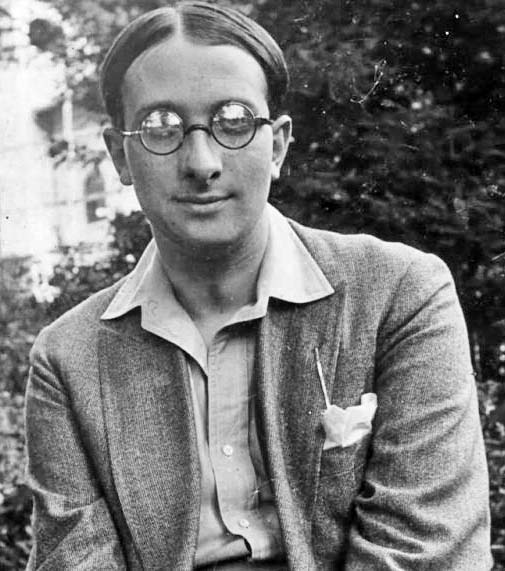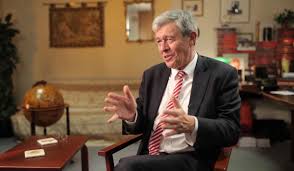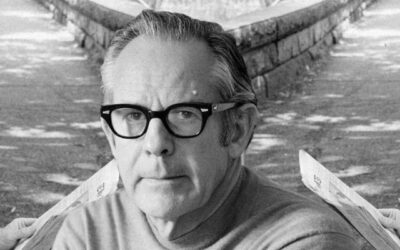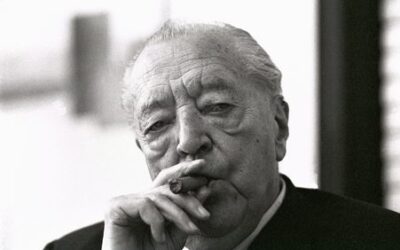Mircea Eliade’s Insights into the Sacred

“A religious symbol conveys its message even if it is no longer consciously understood in every part. For a symbol speaks to the whole human being and not only to the intelligence.”
― Mircea Eliade, The Sacred and the Profane: The Nature of Religion
Mircea Eliade, a Romanian historian of religion who lived from 1907 to 1986, made significant contributions to the study of comparative religion and the understanding of the role of myth, symbol, and the sacred in human experience. His ideas about the nature of religious experience and its relationship to the human psyche resonate deeply with the psychological theories of Carl Jung, the founder of analytical psychology.
Main Ideas:
- Eliade was a Romanian historian of religion who made significant contributions to the study of comparative religion and the role of myth, symbol, and the sacred in human experience.
- He introduced the concept of the sacred and profane as fundamental categories of human experience.
- Eliade believed that the experience of the sacred is universal and essential for creating meaning in human existence.
- He emphasized the importance of myth and symbol in structuring human experience and transmitting sacred knowledge.
- Eliade’s ideas resonate with Carl Jung’s concepts of the collective unconscious and archetypes.
- His work has implications for psychotherapy, suggesting that healing may involve reconnecting with sacred dimensions of existence.
- Eliade’s concept of hierophanies refers to manifestations of the divine in the world.
- He argued that myths reveal structures of reality and provide models for human behavior and meaning-making.
- Eliade’s work influenced transpersonal psychology and the integration of spiritual perspectives into therapeutic processes.
- His ideas have been influential in comparative religion, political science, and philosophy.
- Eliade explored how sacred objects and rituals help create order and meaning in the face of chaos and uncertainty.
- He emphasized the role of interpretation and the subject in creating meaning, influencing hermeneutic philosophy.
- Eliade’s work contributed to the development of the phenomenological approach to studying religion.
- He wrote extensively on shamanism, cyclical time in traditional societies, and the history of religious ideas.
- Despite some critiques, Eliade’s legacy continues to influence the study of religion, mythology, and human culture.
Eliade’s Concept of the Sacred and the Profane
Central to Eliade’s work is the distinction between the sacred and the profane. He argued that for religious humans, the world is divided into two fundamental categories: the sacred, which is the realm of the divine, the transcendent, and the eternal; and the profane, which is the realm of the ordinary, the temporal, and the mundane.
According to Eliade, the experience of the sacred is a universal human phenomenon that is essential for the creation of meaning and the structuring of human existence. He believed that the sacred revealed itself to humans through hierophanies, or manifestations of the divine in the world, such as sacred spaces, objects, and events.
Eliade’s understanding of the sacred as a fundamental category of human experience resonates with Jung’s concept of the numinous, which refers to the experience of the divine or the transcendent that evokes feelings of awe, mystery, and fascination.
Myth, Symbol, and the Collective Unconscious
Eliade also emphasized the importance of myth and symbol in the structuring of human experience and the transmission of sacred knowledge. He argued that myths are not merely primitive or pre-rational forms of thought, but rather profound expressions of the human encounter with the sacred.
According to Eliade, myths serve to reveal the structures of reality and to provide models for human behavior and meaning-making. They are not simply stories or legends, but rather living realities that shape the way individuals and communities understand themselves and their place in the world.
This understanding of myth as a fundamental category of human experience resonates deeply with Jung’s concept of the collective unconscious and its archetypes. Jung believed that the collective unconscious was a universal dimension of the psyche that contained primordial images and patterns that shape human experience and behavior.
Like Eliade, Jung saw myths and symbols as expressions of the archetypal patterns of the collective unconscious, and believed that they played a crucial role in the process of individuation and the development of the self.
The Relevance of Eliade’s Ideas for Psychotherapy
Eliade’s insights into the nature of the sacred and the role of myth and symbol in human experience have significant implications for the practice of psychotherapy. His work suggests that the experience of the sacred is not merely a religious or spiritual phenomenon, but rather a fundamental aspect of human psychology that shapes our sense of meaning, purpose, and identity.
In the context of psychotherapy, this perspective invites us to explore the ways in which individuals’ experiences of the sacred and the profane shape their psychological and emotional lives. It suggests that the process of healing and transformation may involve a reconnection with the sacred dimensions of existence, and a reintegration of the individual into a larger context of meaning and purpose.
Moreover, Eliade’s emphasis on the importance of myth and symbol in the structuring of human experience suggests that the exploration of mythological and symbolic themes may be a valuable tool in the therapeutic process. By helping individuals to connect with the archetypal patterns and images that shape their inner lives, therapists can facilitate a process of deep psychological and spiritual growth.
This perspective is particularly relevant in the context of depth psychology and Jungian psychotherapy, which emphasize the exploration of the unconscious mind and the integration of the various aspects of the psyche. By drawing on Eliade’s insights into the nature of the sacred and the role of myth and symbol in human experience, Jungian therapists can help individuals to connect with the deeper layers of their being and to find meaning and purpose in their lives.
Mircea Eliade’s insights into the nature of the sacred and the role of myth and symbol in human experience offer a rich and provocative framework for understanding the relationship between religion, psychology, and the human quest for meaning and purpose. His ideas resonate deeply with the psychological theories of Carl Jung, and suggest that the experience of the sacred is not merely a religious or spiritual phenomenon, but rather a fundamental aspect of human psychology.
By exploring the ways in which individuals’ experiences of the sacred and the profane shape their psychological and emotional lives, and by drawing on the rich symbolic and mythological heritage of human culture, psychotherapists can help individuals to connect with the deeper layers of their being and to find meaning and purpose in their lives.
Order and Chaos in History and Society

Aboriginal Wooden Churinga
In his work, Eliade describes how the Aborigines of Australia attach sacred significance to certain objects, such as the churinga, a wooden or stone object that is believed to embody the essence of a person’s totemic ancestor. The churinga is not merely a physical object, but a symbol of the sacred realm that provides a link between the individual and the timeless, mythical world of the ancestors.
For the Aborigines, the churinga serves as a means of creating order and meaning in a world that is often experienced as chaotic and unpredictable. By connecting with the sacred realm through the churinga, individuals are able to transcend the limitations of the profane world and to participate in a larger, more meaningful context of existence.
This need to create order and meaning in the face of chaos and uncertainty is not unique to the Aborigines, but is rather a fundamental aspect of human psychology. From a psychological perspective, the creation of meaning and the search for order can be seen as a way of coping with the inherent uncertainty and ambiguity of existence.
In the face of life’s challenges and difficulties, individuals seek to create a sense of coherence and purpose that can provide a framework for understanding and navigating the world. This process of meaning-making can take many forms, from the creation of personal narratives and belief systems to the adoption of cultural and religious traditions.
The order-chaos dichotomy that Eliade describes can be seen as a reflection of the basic human need for structure and predictability in the face of the unknown. By creating a sense of order and meaning, individuals are able to reduce anxiety and to maintain a sense of control and agency in their lives.
This perspective has broad implications for the field of psychology, particularly in the areas of personality development, coping and resilience, and the treatment of mental health issues. For example, the concept of meaning-making has been identified as a key factor in the development of resilience and the ability to cope with stress and adversity.
Research has shown that individuals who are able to find meaning and purpose in their lives, even in the face of significant challenges and difficulties, are more likely to experience positive mental health outcomes and to be able to bounce back from setbacks and adversity.
Similarly, the process of psychotherapy can be seen as a way of helping individuals to create a sense of order and meaning in their lives, particularly in the face of emotional and psychological distress. By exploring the individual’s unique experiences and belief systems, and by helping them to develop a more coherent and meaningful narrative of their lives, therapists can facilitate the process of healing and growth.
Eliade’s insights into the nature of the sacred and the profane, and his analysis of the significance of the churinga among the Aborigines, offer a powerful reminder of the fundamental human need for meaning and order in the face of chaos and uncertainty. By recognizing the ways in which individuals seek to create a sense of coherence and purpose in their lives, psychologists and therapists can develop more effective and transformative approaches to healing and growth.
The Implications of Eliade’s Work on Other Fields
Mircea Eliade’s work has had a profound influence on a wide range of fields, including psychotherapy, comparative religion, political science, and philosophy. His insights into the nature of the sacred and the profane, the role of myth and symbol in human experience, and the relationship between religion and culture have shaped the way scholars and practitioners approach these subjects.
In the field of psychotherapy, Eliade’s ideas have been particularly influential in the development of transpersonal psychology and the integration of spiritual and religious perspectives into the therapeutic process. Transpersonal psychology, which emerged in the 1960s and 1970s, seeks to integrate insights from various spiritual and mystical traditions into the understanding and treatment of mental health issues.
Eliade’s emphasis on the importance of the sacred and the role of myth and symbol in human experience has been a key influence on transpersonal psychology, which recognizes the spiritual and transcendent dimensions of the human psyche. His work has also influenced the development of Jungian psychology and the archetypal approach to psychotherapy, which draws on the rich symbolic and mythological heritage of human culture to explore the depths of the unconscious mind.
In the field of comparative religion, Eliade’s work has been seminal in shaping the way scholars approach the study of religious traditions and practices. His concept of the sacred and the profane has become a foundational framework for understanding the nature of religious experience, and his analysis of the role of myth and symbol in religious traditions has been widely influential.
Eliade’s work has also been important in the development of the phenomenological approach to the study of religion, which seeks to understand religious experiences and practices from the perspective of the believer. This approach, which emphasizes the importance of empathy and the suspension of judgment in the study of religion, has been widely adopted in the field of comparative religion and has helped to promote a more nuanced and respectful understanding of diverse religious traditions.
In the field of political science, Eliade’s ideas have been influential in the study of nationalism and the role of religion in politics. His analysis of the sacred and the profane has been used to explore the ways in which political ideologies and movements often draw on religious themes and symbols to create a sense of meaning and purpose.
Eliade’s work has also been important in the study of fascism and totalitarianism, particularly in his analysis of the ways in which these ideologies often seek to create a sense of sacred purpose and to mobilize the masses through the use of myth and symbol. His insights into the relationship between religion and politics have helped to shed light on the complex and often troubling ways in which these two domains intersect.
Finally, in the field of philosophy, Eliade’s work has been influential in the development of hermeneutics and the philosophy of religion. His emphasis on the importance of interpretation and the role of the subject in the creation of meaning has been a key influence on hermeneutic philosophy, which seeks to understand the ways in which individuals and communities interpret and make sense of their experiences.
Eliade’s work has also been important in the development of the philosophy of religion, particularly in his analysis of the nature of religious experience and the relationship between religion and culture. His insights into the sacred and the profane have helped to shape the way philosophers approach the study of religion and have contributed to a more nuanced and complex understanding of the role of religion in human life.
Mircea Eliade’s work has had a far-reaching influence on a wide range of fields, from psychotherapy and comparative religion to political science and philosophy. His insights into the nature of the sacred and the profane, the role of myth and symbol in human experience, and the relationship between religion and culture have helped to shape the way scholars and practitioners approach these subjects and have contributed to a more nuanced and respectful understanding of the complexities of human experience. As the study of religion, psychology, and politics continues to evolve and expand, Eliade’s legacy will undoubtedly continue to inspire and inform new generations of thinkers and practitioners.
Mircea Eliade’s Life and Work
Mircea Eliade (1907-1986) was a prolific and influential Romanian historian of religion, philosopher, and novelist who made groundbreaking contributions to the study of religion, mythology, and the sacred. His work has had a lasting impact on the fields of religious studies, anthropology, and philosophy, and continues to be widely read and discussed today.
Early Life and Education
Mircea Eliade was born on March 9, 1907, in Bucharest, Romania. He grew up in a middle-class family and showed an early interest in literature, philosophy, and the study of religions. Eliade attended the University of Bucharest, where he studied philosophy under the guidance of renowned scholar Nae Ionescu. He received his PhD in Philosophy in 1928 with a thesis on Italian Renaissance philosopher Marsilio Ficino.
During his university years and in the following decade, Eliade traveled extensively throughout Europe and India, immersing himself in the study of world religions and cultural traditions. His experiences in India, where he studied yoga and met with several spiritual leaders, had a profound impact on his intellectual development and later work.
Academic Career
Upon returning to Romania, Eliade became a professor of the History of Religions at the University of Bucharest in 1933. He held this position until 1940, when the political situation in Romania during World War II forced him into exile. Eliade spent several years abroad, first in Lisbon, Portugal, and then in the United States, where he continued his research and writing.
In 1957, Eliade joined the faculty of the University of Chicago as a professor of the History of Religions at the Divinity School and in the Committee on Social Thought. He played a crucial role in establishing the study of religion as an academic discipline in the United States and attracted a large following of students and scholars. Eliade remained at the University of Chicago until his retirement in 1986.
Major Published Works
Mircea Eliade produced an extensive body of work consisting of books, essays, and articles that deeply influenced the study of religion and mythology worldwide. Some of his key publications include:
“Patterns in Comparative Religion” (1949)
In this work, Eliade examined the universal patterns and structures that underlie religious phenomena across cultures. He identified the concept of hierophany, or the manifestation of the sacred in the world, as a key element in understanding religious experience.
“The Myth of the Eternal Return” (1949)
This book explores the concept of cyclical time and the role of the sacred in traditional societies. Eliade argues that in these cultures, time is experienced as a repetition of mythical archetypes and that religious rituals serve to periodically restore the world to its original, sacred state.
“The Sacred and the Profane” (1957)
In this work, Eliade analyzes the fundamental distinction between the sacred and the profane dimensions of human existence. He argues that the sacred is the realm of the truly real and that religious experience involves a transformation of profane, ordinary reality into a sacred space and time.
“Shamanism: Archaic Techniques of Ecstasy” (1964)
This pioneering study examines the phenomenon of shamanism across traditional cultures and its role in mediating between the human and spirit worlds. Eliade explores the initiation, techniques, and symbolic systems of shamanic practice and argues for its central importance in the history of religions.
“A History of Religious Ideas” (3 volumes, 1978-1985)
This monumental work traces the development of religious ideas from prehistoric times to the modern era. Eliade’s sweeping narrative covers a vast array of traditions and cultures, demonstrating the richness and diversity of human religious expression throughout history.
Influence and Legacy
Mircea Eliade’s work has had a profound and lasting impact on the study of religion, mythology, and the sacred. His comparative approach, which sought to identify universal patterns and structures across diverse religious traditions, helped to establish the modern discipline of religious studies and inspired generations of scholars.
Eliade’s concepts, such as hierophany, the sacred and the profane, and the myth of the eternal return, have become central to the vocabulary and conceptual framework of religious studies. His work has also influenced scholars in related fields, such as anthropology, history, and philosophy, and has contributed to a greater understanding of the role of religion in human culture and society.
Despite some critiques of his approach, particularly regarding his tendency to universalize and decontextualize religious phenomena, Eliade’s legacy as a pioneering scholar of religion remains secure. His vast body of work continues to be widely read, discussed, and debated, testifying to the enduring relevance and significance of his ideas.
Mircea Eliade’s life and work stand as a testament to the power and importance of the study of religion in understanding the human experience. Through his tireless scholarship, innovative concepts, and comparative approach, Eliade helped to shape the modern understanding of religion and its place in human history and culture. His legacy continues to inspire and inform the work of scholars and students of religion around the world.
Read More Depth Psychology Articles:
Taproot Therapy Collective Podcast
Mystics and Gurus
Bibliography:
- Eliade, M. (1949). Patterns in Comparative Religion.
- Eliade, M. (1949). The Myth of the Eternal Return.
- Eliade, M. (1957). The Sacred and the Profane: The Nature of Religion.
- Eliade, M. (1964). Shamanism: Archaic Techniques of Ecstasy.
- Eliade, M. (1978-1985). A History of Religious Ideas (3 volumes).
Further Reading:
- Allen, D. (1998). Myth and Religion in Mircea Eliade. Routledge.
- Rennie, B.S. (1996). Reconstructing Eliade: Making Sense of Religion. State University of New York Press.
- Cave, D. (1993). Mircea Eliade’s Vision for a New Humanism. Oxford University Press.
- Olson, C. (1992). The Theology and Philosophy of Eliade: A Search for the Centre. St. Martin’s Press.
- Ricketts, M.L. (1988). Mircea Eliade: The Romanian Roots, 1907-1945. East European Monographs.
- Jung, C.G. (1969). The Archetypes and the Collective Unconscious. Princeton University Press.
- Campbell, J. (1949). The Hero with a Thousand Faces. Pantheon Books.
- Otto, R. (1917). The Idea of the Holy. Oxford University Press.
- Smith, J.Z. (1978). Map Is Not Territory: Studies in the History of Religions. University of Chicago Press.
- Durkheim, E. (1912). The Elementary Forms of Religious Life. Free Press.
- Pals, D.L. (2006). Eight Theories of Religion. Oxford University Press.
- Wach, J. (1958). The Comparative Study of Religions. Columbia University Press.
- Taylor, C. (2007). A Secular Age. Harvard University Press.
- Berger, P.L. (1967). The Sacred Canopy: Elements of a Sociological Theory of Religion. Doubleday.
- Csordas, T.J. (1994). The Sacred Self: A Cultural Phenomenology of Charismatic Healing. University of California Press.


























0 Comments